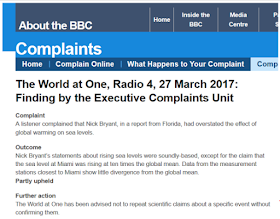It's typical though that they only "partly upheld" the complaint.
The fine folk who reside in the desparate-last-ditch-effort sector of the BBC's complaints process (of what scientific pedigree or level of knowledge?) still judged the main thrust of Nick's report to be "soundly-based", even though they found him to be grossly inaccurate on that one specific point...
...which, I must say, is jolly nice of them.


I can't recall if it was his report, but I remember a BBC report led me to investigate the issue. As I recall the BBC report tried to link the problem of flooding to global warming. Basically Florida is not very stable - mostly marshy stuff and leaky limestone. There has been a huge amount of building and it is the human made stuff that is pushing down ground level, resulting in more flooding during storms as water finds its way through the limestone. If you believe that global warming is raising sea levels, that might make things worse but it is the land sinking which is the real problem.
ReplyDeleteOn the "Further Action" how on Earth are WATO reporters supposed to "repeat scientific claims without confirming them"? Are they supposed to set up their own lab and employ a team of Nobel Prize winning scientists who can outthink and outperform all other scientists?? What a load of phooey that we are paying for...
ReplyDeleteShould be "supposed to NOT"...
DeleteI think confirmation by checking a second source (i.e. a qualified scientist) would suffice on this front. The problem in this case wasn't that two scientists disagreed, it was that the presenter misrepresented the research that had been done.
Delete'Partly upheld' seems the 'little bit pregnant' of BBC science facts.
ReplyDeleteDoesn't it just! :)
Delete